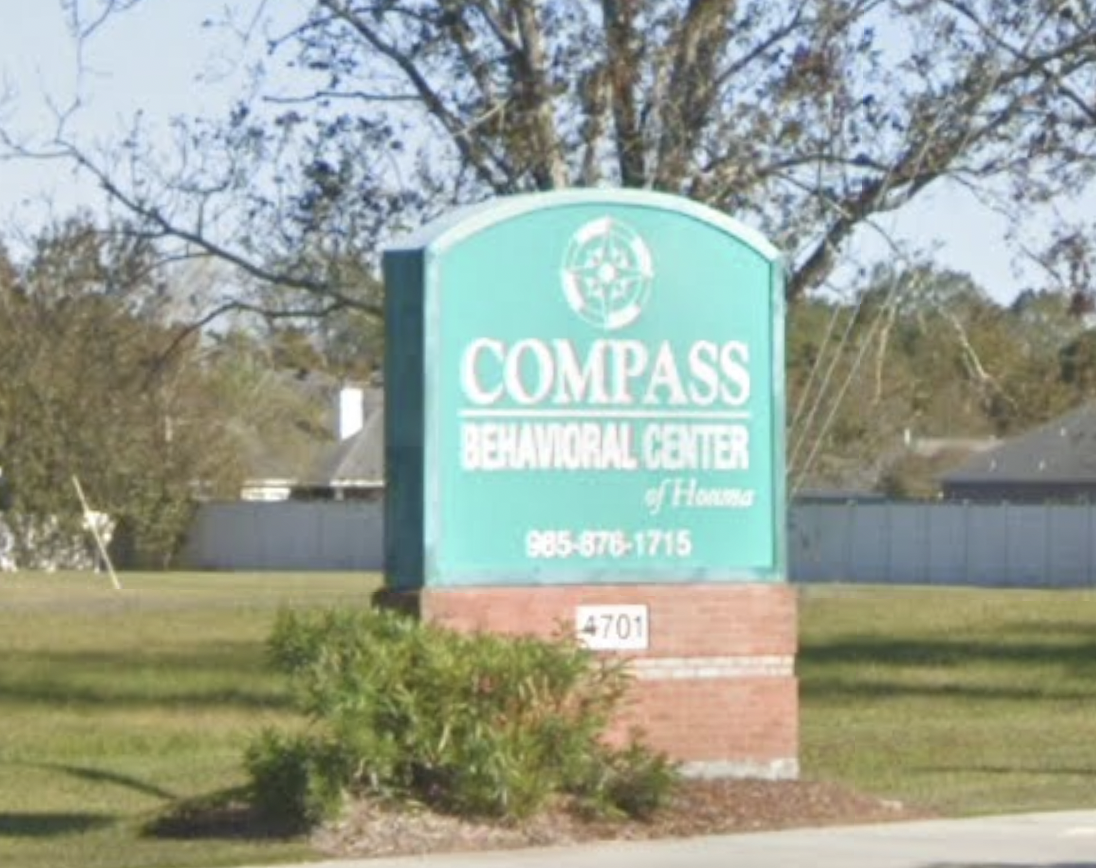Overview
Compass Behavioral Center is an mental health treatment center that provides inpatient treatment for men and women between 18 and 65+ years of age. As part of their special programs, Compass Behavioral Center To help patients achieve sobriety, Compass Behavioral Center provides intake assessments. Afterward, patients receive group counseling, integrated mental and substance use disorder treatment, and activity therapy during treatment. Compass Behavioral Center is located in Houma, Louisiana, providing treatment for people in Terrebonne County, accepting cash or self-payment, medicaid, and medicare.
Compass Behavioral Center at a Glance
Payment Options
- Cash or self-payment
- Medicaid
- Medicare
- State-financed health insurance plan other than Medicaid
- Private health insurance
Assessments
- Screening for tobacco use
- Comprehensive mental health assessment
- Comprehensive substance use assessment
Age Groups
- Adults
- Seniors
Ancillary Services
- Case management service
- Chronic disease/illness management
- Court-ordered outpatient treatment
- Illness management and recovery
- Suicide prevention services
Treatment At Compass Behavioral Center

Conditions Treated
Alcoholism:
Alcohol addiction is a disease that changes the way the brain works. It causes negative emotions, impulsive behavior, cravings and withdrawal symptoms. Treatment for alcohol addiction includes supervised detox, counseling and therapy, and support group participation. Rehabilitation does not cure alcoholism. Instead, it helps the individual manage their addiction, restore their functioning, and well-being.
Mental health treatment:
Mental health treatment involves various therapies and support services provided by licensed professionals to address mental health issues. These interventions, which can include therapy, medication, and holistic approaches, aim to enhance well-being, improve coping, and empower individuals to lead fulfilling lives. It's personalized, comprehensive care for mental health challenges.
Substance use treatment:
Substance use rehabilitation embodies a holistic treatment approach crafted to assist individuals contending with drug or alcohol addiction. This all-encompassing rehabilitation strategy encompasses two crucial components: initially addressing the physical dependency, frequently commencing with detoxification, and subsequently confronting the psychological triggers through a diverse array of therapeutic methods. The overarching objective is to empower individuals to achieve and maintain sobriety while equipping them with essential skills and coping mechanisms for a successful reintegration into society and a life free from substance abuse.
Co-occurring Disorders:
Dual-diagnosis rehabilitation centers specialize in the treatment of individuals who suffer from a co-occurring mental health disorder and a substance use disorder. This complex interplay between addiction and mental health can make recovery more challenging, as each condition may exacerbate the symptoms of the other. Dual-diagnosis rehabilitation centers offer an integrated approach that addresses both issues simultaneously and often includes a comprehensive assessment for an Integrated Treatment Approach through Holistic Therapies, including family therapy and aftercare treatment.

Levels Of Care
Hospital inpatient/24-hour hospital inpatient:
The 24-Hour Hospital Inpatient for Addiction Treatment program offers comprehensive, round-the-clock medical care and support for individuals grappling with substance use disorders and addictions. Situated within a medical hospital environment, this specialized inpatient program is designed to address both the immediate and long-term needs of patients, ensuring their safety, stabilization, and comprehensive recovery.

Treatment Modalities
Group counseling:
Group Counseling is a therapeutic approach where individuals come together under the guidance of a trained counselor to share experiences, offer support, and gain insights. This collective format promotes mutual understanding and growth, allowing participants to learn from one another's perspectives and challenges.
Integrated Mental and Substance Use Disorder treatment:
Integrated Mental and Substance Use Disorder treatment is a comprehensive approach to treating individuals with both mental health and substance use disorders. It aims to address both conditions simultaneously through a coordinated and integrated approach. The goal is to improve overall well-being and reduce the risk of relapse.
Activity therapy:
Activity Therapy refers to a therapeutic approach utilized in rehab centers to promote physical, emotional, cognitive, and social healing. Through structured and guided activities, patients are encouraged to engage in tasks that stimulate the mind, enhance motor skills, foster interpersonal relationships, and bolster self-esteem. By participating in diverse activities, from arts and crafts to group games, patients not only distract from negative thoughts or behaviors but also develop coping mechanisms, resilience, and a sense of purpose. It's a holistic way of enhancing an individual's overall well-being while in the recovery process.
Telemedicine/telehealth therapy:
Telehealth Therapy enables individuals to access mental health services remotely through digital technology. Utilizing secure video conferencing, individuals can engage with qualified therapists from the comfort of their home, overcoming geographical barriers and often reducing waiting times. This level of care offers a flexible and accessible approach to mental health support, especially beneficial for those with mobility issues, busy schedules, or residing in rural or underserved areas.
Smoking/vaping/tobacco cessation counseling:
Vaping Cessation Counseling is a supportive process aimed at assisting individuals who wish to quit vaping. Through personalized sessions, trained counselors help identify triggers, manage withdrawal symptoms, and develop coping strategies. This service empowers individuals to break free from vaping addiction and work towards achieving a healthier lifestyle.
Abnormal involuntary movement scale:
The AIMS serves as a 12-criteria tool employed by clinicians to assess the severity of dyskinesias, particularly in facial expressions, limb motions, and torso movements, observed in patients undergoing neuroleptic drug treatment. Additionally, it evaluates the overall repercussions, the extent of disability incurred, and the patient's awareness and distress regarding these movements. This assessment tool finds extensive application in research investigations concerning antipsychotic medications to screen for tardive dyskinesia. Its simple framework and rapid evaluation procedure facilitate routine clinical assessments conducted by healthcare professionals or qualified individuals.
Ancillary Services
Additional Services
- Pharmacotherapies administered during treatment
- STD testing
Contact Information
DISCLAIMER: The facility name, logo and brand are the property and registered trademarks of Compass Behavioral Center, and are being used for identification and informational purposes only. Use of these names, logos and brands shall not imply endorsement. BetterAddictionCare.com is not affiliated with or sponsored by Compass Behavioral Center.



